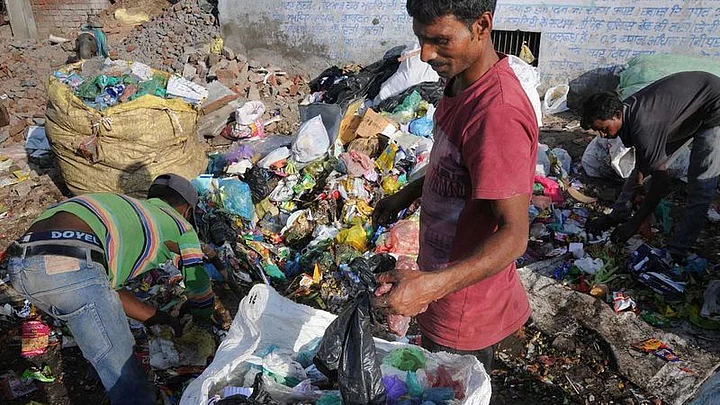The draft Plastic Waste Management Rules, February 2021 proposes a three-phase ban on Single-Use Plastic (SUP)s, to eliminate use of SUP by 2022 in India. This has profound implications for plastic manufacturers and the largely unorganised plastic waste processing sector, employing over four million people, including marginalised groups such as ragpickers, kabadiwallas, and smaller scrap dealers.
India generates over 3.3 million metric tonnes of single-use plastic annually.
The contemporary consumeristic ‘use-and-throw’ culture, coupled with the COVID-19 crisis wherein SUPs have become ubiquitous through disposable masks, PPE kits, sanitiser sachets, etc, has aggravated the problem to menacing proportions, resulting in large-scale destruction of marine ecosystems and biodiversity loss.
Microplastics make their way into the human food chain through consumption of marine and land animals that have ingested plastic waste.
Over 50 percent of the plastic waste remains uncollected and accumulates in landfills, creating a breeding ground for disease-spreading mosquitoes and flies.
Plastic also results in a significant carbon footprint. The entire lifecycle of plastics starting with extraction and transportation of fossil fuels for plastic production to end-of-life disposal at landfills or incineration plants generates billions of tonnes of greenhouse gas (GHG) emissions.
Global plastic production is likely to be tripled by 2050, accounting for about 13 percent of the world’s carbon budget.
With India’s Nationally Determined Contributions (NDCs) of lowering its emissions intensity by 33-35 percent by 2030, banning SUPs is an important step to meet the country’s climate change commitments, requiring concerted efforts to create a circular plastics economy.
The Need For a 'Circular Plastics Value Chain'
Plastic packaging material flows follow a take-make-waste-lose linear model. Most recycling initiatives are fragmented and focus on downstream solutions. For instance, turning plastic waste to fuel may generate one-time extra value. However, the materials that could otherwise be recovered are now lost from the economy, leading to the continued requirement for new virgin materials to manufacture the next generation of products.
An ideal circular economy keeps materials in circulation within the economy at their highest value and recycling is used as a last resort.
It is different from closed-loop recycling (recycling plastics into the same or similar quality products) and cascaded recycling (recycling of plastics into other, lower-value products).
The New Plastics Economy initiative by the UK-based Ellen McArthur Foundation mandates three key actions to enable a circular economy:
Eliminate the plastics we do not need.
Innovate to ensure that plastics we do need are reusable, recyclable, or compostable.
Circulate all plastic material we use to keep them in the economy and out of the environment.
In India, the role of ragpickers, urban local bodies, municipal solid waste facilities, disposal centers, and recyclers, is critical to achieve a disciplined and formal system of waste collection and segregation. Several Producer Responsibility Organizations (PROs) including Shakti Plastics, Saahas Zero Waste, Banyan Nation, assist top brands with their Extended Producer Responsibility (EPR) obligations to manage plastic waste.
Radical Innovation is the Only Way Forward
There is a huge gap between policy intent and reality while implementing bans on plastics.
Historically, blanket plastic bans have failed to be efficacious policy tools.
Banning SUP must be backed with efforts to catalyse a systemic change to address the plastic pollution problem.
The role of plastic producers and recyclers is to ensure that all types of plastics remain in use within the economy and out of the environment.
New business-to-consumer packaging reuse models could be introduced. For instance, The Better Home has a take-back programme for packaging where refill pouches are delivered to consumers with a pre-addressed envelope, which can be utilised to send the used pouches back to the company. Recently, Hindustan Unilever launched in-store vending machines enabling customers to refill bottles of Surf Excel, Vim, and Comfort.
Investments in R&D can help develop edible and biodegradable packaging material derived from seaweed and plants to replace single-use beverage bottles, sachets, and cups. Transitioning from liquid to solid personal care products such as soaps, fragrance, toothpaste, etc, will eliminate the need for plastic containers. Plant-derived materials extracted from seeds, peels, and pulp can replace shrink wraps for packing vegetables and fruits.
All disposable packaging and material at stores, restaurants and malls should be additionally charged to disincentivise use of throw-away plastics.
The Indian government and individual plastic manufacturing and recycling businesses could join the New Plastics Economy Global Commitment with ambitious plastic reduction targets. Cross-value chain collaboration could beget radical innovation for scalable solutions to deliver on these targets.
(Ahaana Mahanti is a Research Associate at the Indian School of Business. Sanjana Gorti works in the environment and climate change space. Professor DVR Seshadri is a Clinical Full Professor of Business - Marketing Area at Indian School of Business. This is an opinion piece and the views expressed above are the authors' own. The Quint neither endorses nor is responsible for the same.)
